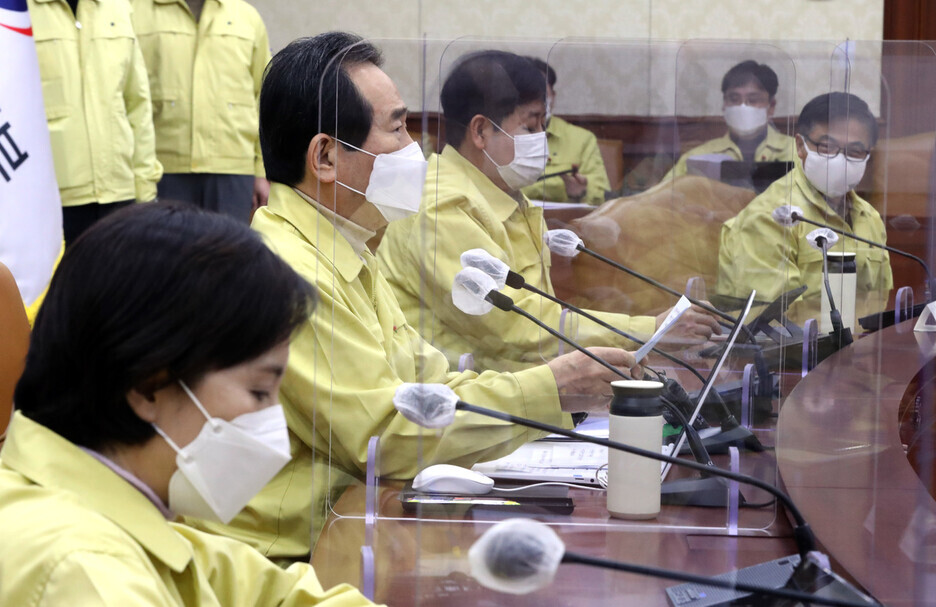hankyoreh
Links to other country sites 다른 나라 사이트 링크
Current social distancing extended through end of Lunar New Year on Feb. 14

The South Korean government has decided to extend its current COVID-19 social distancing level for the two weeks until Feb. 14, when the extended Lunar New Year holiday ends.
The ban on private gatherings of five or more people will remain in effect over the Lunar New Year. Even direct relatives won’t be allowed to assemble in groups of five or more if they live in different residences.
In consideration of livelihood issues for small business operators, the government also said it would hold more discussions in a week on whether to adjust the social distancing level.
On Jan. 31, the Central Disaster and Safety Countermeasure Headquarters (CDSCH) announced that it was extending its current measures through Feb. 14. These include Level 2.5 social distancing in the greater Seoul area and Level 2 distancing outside of it, as well as a ban on private gatherings of five or more people and restrictions on restaurants and cafes operating past 9 pm.
“Vaccine administration and the beginning of the new academic year in March can only take place smoothly if the third wave of infections has been stabilized by the Lunar New Year holiday,” explained Prime Minister Chung Sye-kyun.
“This can be used as a springboard for returning to our precious daily lives,” he added.
The government maintained its restriction on multiuse facilities operating past 9 pm. Cafes and restaurants will only be allowed to provide in-store service through 9 pm. Indoor athletic facilities and singing establishments will be able to operate through 9 pm, provided that they follow disease control guidelines and restrict visitors to one person per eight square meters of area.
Disease control guidelines were also adjusted for certain multiuse facilities.
Previous restrictions on performance venues and movie theaters required even people attending together to sit at least one seat apart. Future measures will require people to sit at least one seat apart from those not in their group at Levels 1.5 and 2, and at least two seats apart from those outside their group at Level 2.5.
A ban on the use of showers at indoor athletic facilities in the greater Seoul area has also been lifted, as long as users keep at least one empty stall between them. Restrictions on the operation of ski resorts and other winter sports establishments after 9 pm have also been lifted.
The CDSCH’s decision was based on fears of a resurgence in the current third wave. Since the discovery of a large cluster infection last week originating with the International Mission (IM), other clusters have been found at Hanyang University Seoul Hospital and adult gaming establishments in Gwangju.
The virus’s reproduction number (R number) was calculated at 0.95 last week, bringing it slightly closer to 1 – a difference that determines whether the rate of infection holds steady or begins to rise again.
“Not only is there a greater risk of infection as more people travel between regions and gather ahead of the Lunar New Year holiday, but we need to reduce and stabilize the number of patients being diagnosed so that we can proceed smoothly with the vaccinations when they begin in late February and with the academic calendar that begins in March,” explained Kang Do-tae, first general coordinator for the Central Disease Control Headquarters.
Chung also said that official word had been received on Jan. 30 that “the COVAX Facility will be supplying enough doses of the Pfizer vaccine for around 60,000 people by as early as mid-February.” The COVAX Facility is a global framework for joint purchases of COVID-19 vaccines.
“At least 300,000 individuals’ worth of doses of the AstraZeneca vaccine will also be supplied through COVAX in February to March,” he added.
By Kim Ji-hoon, staff reporter
Please direct comments or questions to [english@hani.co.kr]

Editorial・opinion
![[Column] Will Seoul’s ties with Moscow really recover on their own? [Column] Will Seoul’s ties with Moscow really recover on their own?](https://flexible.img.hani.co.kr/flexible/normal/500/300/imgdb/original/2024/0513/5917155871573919.jpg) [Column] Will Seoul’s ties with Moscow really recover on their own?
[Column] Will Seoul’s ties with Moscow really recover on their own?![[Column] Samsung’s ‘lost decade’ and Lee Jae-yong’s mismatched chopsticks [Column] Samsung’s ‘lost decade’ and Lee Jae-yong’s mismatched chopsticks](https://flexible.img.hani.co.kr/flexible/normal/500/300/imgdb/original/2024/0512/3017154788490114.jpg) [Column] Samsung’s ‘lost decade’ and Lee Jae-yong’s mismatched chopsticks
[Column] Samsung’s ‘lost decade’ and Lee Jae-yong’s mismatched chopsticks- [Correspondent’s column] The real reason the US is worried about Chinese ‘overcapacity’
- [Editorial] Yoon’s gesture at communication only highlights his reluctance to change
- [Editorial] Perilous stakes of Trump’s rhetoric around US troop pullout from Korea
- [Guest essay] Preventing Korean Peninsula from becoming front line of new cold war
- [Column] The state is back — but is it in business?
- [Column] Life on our Trisolaris
- [Editorial] Penalties for airing allegations against Korea’s first lady endanger free press
- [Editorial] Yoon must halt procurement of SM-3 interceptor missiles
Most viewed articles
- 1Ado over Line stokes anti-Japanese sentiment in Korea, discontent among Naver employees
- 2[Column] Samsung’s ‘lost decade’ and Lee Jae-yong’s mismatched chopsticks
- 3Korean opposition decries Line affair as price of Yoon’s ‘degrading’ diplomacy toward Japan
- 4US has always pulled troops from Korea unilaterally — is Yoon prepared for it to happen again?
- 5Korean auto industry on edge after US hints at ban on Chinese tech in connected cars
- 6[Editorial] Yoon’s gesture at communication only highlights his reluctance to change
- 7[Correspondent’s column] The real reason the US is worried about Chinese ‘overcapacity’
- 8[Column] Will Seoul’s ties with Moscow really recover on their own?
- 9[Photo] Korean students protest US complicity in Israel’s war outside US Embassy
- 101 in 3 S. Korean security experts support nuclear armament, CSIS finds